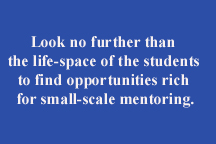|
Social Action/Community Awareness

“There is nothing I can do about it”. These words were uttered by a student frustrated that a group she is involved
with, organized to support GLBTQ students, had not been elevated to official club status at the University. What an opportunity
to make connections to policy and grassroots organizing! When considering social action collaborations:
• look for circumstances that offer a reasonable possibility for change in the short-term
• suggest specific activities that the student can do
• ask for frequent status updates from the student regarding their activities
• make connections in class to student’s activity and concepts under discussion
During the course of the next six weeks the student organized a petition campaign and presented the petition to student
government representatives--resulting in attaining the desired club status for the group. Using the student’s work as
exemplars of social work in action, the class as a whole shared in the progress of the petition campaign. Concepts such as
social work role, ethics of advocacy, interplay of systems concepts, identification and use of strengths in intervention,
all became more real to the class. Tying the student’s petition drive to the social action legacy of the Settlement
Movement made the ‘Golden Era’ of the profession come alive. The investment of a relatively small amount of my
time providing advice and direction paid huge dividends for the student and the class.
Issue Investigation
“I have friends in the Netherlands,” was the student’s response when asked about her keen knowledge of Dutch
health care policy. The student had previously expressed dissatisfaction with the U.S. health care system in light of health
policy she had encountered during her travels in Europe. An opportunity presented itself for a possible collaboration on health
issues. Before embarking on an investigative collaboration the following points should be considered:
• your comfort level around questions of research design/methodology
• does time and circumstance permit you to partially the investigative process? A student’s exposure to any of
the phases of investigation can be meaningful
• your comfort-level with being ‘shadowed’ by a student
• your ability to make connections between collaboration activities and foundation content, especially that of social
worker role and the Code of Ethics, the Ethical Responsibilities to the Profession section
Time and circumstances permitted us to collaborate only on the development of a brief proposal to access University funding
earmarked for student-faculty research projects. Framing the investigative issue as one of comparing aspects of U. S. health
care to health policy in the Netherlands, which was the source of the student’s initial aggravation, not only gave voice
to an interest of hers but provided opportunities for learning as well. The student benefited by taking part in the creative
process. She participated in the translation of an idea into a research question. The student witnessed the creation of consent
forms and the proposal going before the Institutional Review Board. If time and circumstance permit, and we both agree to
continue the collaboration, the student will assist in the data collection process (as it will be her contacts in the Netherlands
that will provide a comparison population) and project write-up. The student’s exposure to aspects of social investigation
has given her a base upon which to build when she enrolls in her research and policy courses in succeeding semesters.
Values Testing
“Are you sure this organization is legal?” was the response I received from a student after she read a newsletter
that advocated ‘leftist’ causes, among them, the basic restructuring of the U. S. economy and social order. I
try to introduce various forms of media that question the values of mainstream America and the status quo of U.S. society.
If we as social workers are to appreciate and to see as strengths the differences in values and points of view, foundation
courses are excellent places to start that reflection process.
• introduce newsletters and headlines that advocate ideas that run counter to mainstream thinking and thus may challenge
a student’s value system
• encourage students to attend meetings of a organization or group whose ideas the student feels ‘uncomfortable’
with –support the uncomfortableness, as it can function as a catalyst for change
• tie the concept of ethnocentrism to the idea of starting ‘where the client is’
• encourage students to reflect on their values and how their present systems support those values
In terms of the above student, I asked her to continue reading the material and to identify what it was about the values
expressed that made her feel uncomfortable. The student ultimately became a member of this organization and supported a number
of its causes through her participation in rallies.
Win-Win-Win
Small-scale collaborations have potential for enriching the learning opportunities for the student involved, the instructor,
and the foundation class as a whole. Mentoring small-scale collaborations can bring additional levels of satisfaction to the
educational experience for all involved as well as provide students needed information with which to make an informed decision
about social work as a major and as a career.
Click here to send an email message to Stephen Burke:
|
